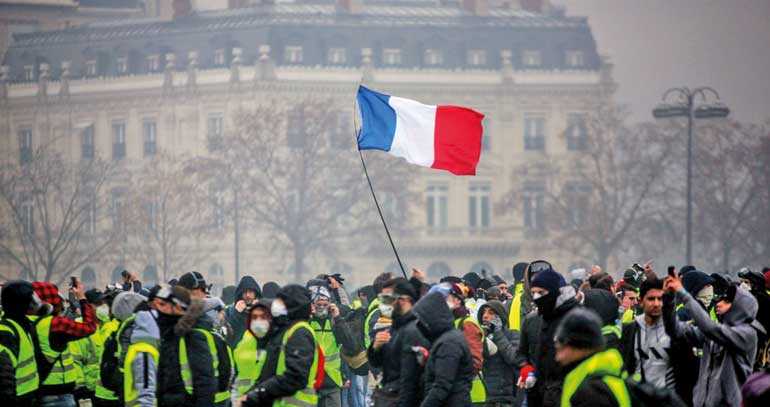Thursday Feb 26, 2026
Thursday Feb 26, 2026
Monday, 24 December 2018 00:04 - - {{hitsCtrl.values.hits}}

From the USA to Australia, and all Western democracies in between, immigration control, border security and population planning have taken centre stage in political campaigns. The last of these is looming as an election issue in Australia.
These issues are a 21st century avatar deliberately designed to make Islamophobia respectful and distract public anger against the more immediate problems of widening economic disparity, violation of human rights, rising global warming, entrenched political tyranny and hardening social injustice and so on.
The undercover Islamophobia and distraction it provides are electoral imperatives for traditional parties in Western democracies because of the rising threat from the far-right, which is eroding into vote banks of established political parties.
The far-right rooted in primordial racial pride of a pre-modern era is converting that pride into predatory Islamophobia. Muslim minorities in Western democracies have fallen prey to this ultra-nationalist monster. These developments are closely linked to the failure of a globalising neoliberal economic order.

Neoliberalism, discontent and Al-Qaeda
The rise of economic neoliberalism in the wake of an almost simultaneous collapse of Keynesian capitalism and Marxian Communism from late 1970s and 1980s, and its march towards global supremacy thereafter under the banner of globalisation, led to worldwide discontent, which threatened a similar collapse of the neoliberal order itself.
Starting in 1999 with the Carnival against Capitalism in London and Battle of Seattle in Washington, the anti-globalisation movement was threatening to spread worldwide to create havoc to the new order. Some distraction was badly needed to turn world’s attention away from this discontent. Bin Laden and his Al-Qaeda came to the rescue.
Following the Al-Qaeda-inspired horror of S11 in 2001 and when George W. Bush Junior declared war on an undefined enemy called terrorism, all anti-globalisation protesters were taken aback and faced the danger of being targeted as terrorists by peace keepers of the new order.
The US military-industrial-congress-complex and its allies became the guardians of the order, and the so-called War on Terrorism, which actually unleashed a ‘war of terror’, as John Pilger contends, took care of any opposition. Anti-globalisation was forced to retreat and take the back seat.
War of Terror, US hegemony and Islamophobia
Apart from protecting the economic order US had its own agenda of expanding its imperial project of world hegemony. The war of terror opened its first theatre by invading oil-rich Iraq and bombing poverty stricken Afghanistan.
Two countries that had nothing to do with S11 were reduced to smithereens by the deadliest of weapons to demonstrate US military might. The consequence however, was to set ablaze the entire world of Islam with an intense hatred of the super power and its Western and Muslim allies. That hatred burst into sporadic acts of violence in several parts of the West, though not on the 2001 scale, and were carried out mostly by a small fringe of Muslim extremists brainwashed by a warped religious ideology emanating ironically from the womb of Wahhabism, the state religion of US ally, Saudi Arabia.
All such violence, indiscriminately dubbed as terrorism, helped the managers of neoliberal order to distract world’s attention away from criticising the order and towards attacking Islam and Muslims. War of terror sowed the seeds of Islamophobia, and after Communism Islam became enemy number one.
Islamophobia and Muslim minorities
The victims of Islamophobia in the West are the Muslim communities that migrated and settled in that part of the world during the second half of the previous century, when rapid industrialisation demanded cheap and mostly semi or unskilled labour to work in factories and infrastructure projects. To these migrants, employment opportunities in the West provided an escape route from poverty in their own overpopulated and underdeveloped homelands. Muslims from Turkey, Pakistan, India, Bangladesh, Algeria, Tunisia, Egypt and Morocco and so on flocked to Britain, Germany, France, America and Scandinavian countries in search of greener pastures.
Although these Muslims were initially employed only temporarily, that temporariness, because of relaxed immigration rules and continuous demand for labour became semi-permanent and eventually permanent, resulting in the growth of Muslim enclaves, notably in Britain, France and Germany. Yet, while wealthy nations were reaping the fruits of cheap Muslim labour no attempt was made in any of these countries to integrate this community into the main stream of society. In short, these nations wanted immigrant labour without the immigrants.
Integration and identity
Integration is a two way process. While Western nations were expecting these migrants to assimilate into the main stream, Muslim migrants in particular showed extreme reluctance to lose their religious identity through assimilation. As a result, Muslim communities remained socially isolated, while public authorities remained negligent to care for the welfare needs of Muslim communities. As the Muslim population increased through new arrivals and natural growth, problems of overcrowding, unemployment and crime manifested disproportionately within that community and maintaining law and order became a problem for authorities.
Towards the end of the last century, as economic growth and prosperity dipped and economic difficulties became acute, Muslim immigrants, in the eyes of the far right, became scape goats for all economic and social evils. The scene was set to bring in immigration control and border security at the centre of domestic electoral power struggle.
Centre-Right, Left and Far Right
Between the end of the Second World War and end of Cold War there were clear economic policy differences between the centre-right and left in all Western democracies. While the former promoted a free-market and competition-oriented economic strategy the latter was more in favour of a state guided market model. Between these two the far-right with its ideology of national-socialism remained a political oblivion.
This situation changed however with the re-entry of economic neoliberalism as the global model. The centre right and left narrowed their traditional economic policy differences and embraced the neoliberal agenda. Any difference between the two sounded marginal as both become slaves to the market, its corporate sector and international managers like IMF, World Bank, WTO and Wall Street. Both sides cooperated to end the welfare state tough at different speed and relegated the important issue of economic distribution to whims of the market.
In the name of creative destruction, globalisation, free trade and competition the neoliberal order created unparalleled economic disparities while financialising economic production, commodifying the environment and debilitating all counterforces to the market. It is this scenario in Western democracies that enabled the far right to re-emerge as a formidable challenge to the centre-right and the left. The far-right is a vigorous defender of corporate capitalism but its enemy are the foreigners who in its view are stealing national wealth and creating terror. Its obvious target are Muslim immigrants and Islamophobia is its campaign chorus.
Islamophobia and traditional parties
Voting behaviour in Western democracies such as US, France, Spain, Italy, Denmark and Australia bear testimony to the fact that the far-right is increasingly becoming popular and have improved their electoral position to become a balancing force between the centre right and left. Far-right is eroding into the traditional vote banks of established political parties. It is as a response to this threat that traditional parties have picked up immigration and border security as major campaign issues without openly condemning Islamophobia that drives those issues.
All three, centre-right, far-right and the left are in bed with neoliberalism and do not want to challenge the ills of the ruling economic model. Just as Bin Laden provided distraction in 2001 with terrorism the far-right is doing the same now with immigration control and border security. How long will this distraction last?
Rebirth of anti-globalisation?
The yellow vest protest movement in France triggered by fuel taxes escalated into a national rebellion against economic inequities, forcing the Macron presidency to back down. Similar protest erupted in Jordan against unfair taxes. In Hungary, protests broke out against compulsory overtime work, dubbed as ‘slave law’. Demonstrators came out on streets against the G20 summit in Buenos Aires for spending $140 million for the mogul durbar.
In Papua New Guinea government buildings were smashed by security personnel, soon after the APEC conference, for non-payment of their wages. There were demonstrations against global warming by school children in Australia; and migrant caravans from Central America are continuing to move towards US and to escape from poverty.
The Arab Spring at the beginning of this decade was another chapter of the same story. All this indicates that Islamophobia is not a powerful distractor and people are rebelling, though not in coordination, against an inequitable and tyrannous economic and political order. The grand failure of economic neoliberalism was best illustrated by Greece only a couple of years ago.
The so-called austerity measures endorsed by IMF brought people to streets, whose anger was suppressed by State terror. It is not immigration, which itself is caused by economic injustice and political tyranny, but an unjust economic order that is at the bottom of global malaise. Islamophobia as a distractor has outlived its usefulness.
(The writer is attached to the School of Business and Governance, Murdoch University, Western Australia.)